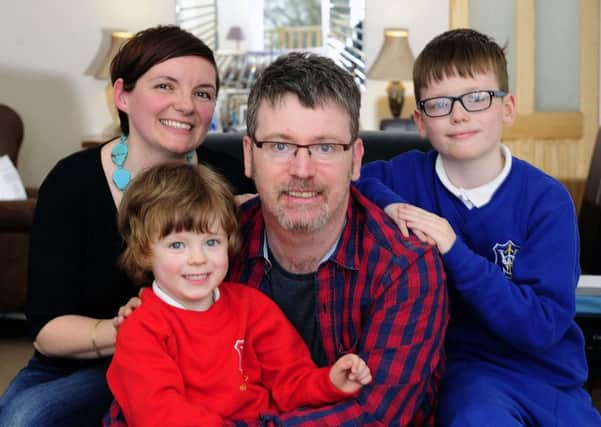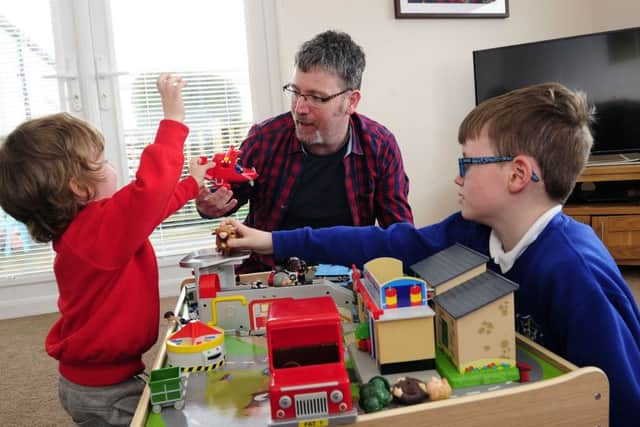Getting on with living with MS


Former hospice nurse Fiona Hutton and her brood are familiar with the lows, and highs, of dealing with a debilitating illness, in their case multiple sclerosis, or MS as it is more widely known.
Fiona Hutton’s husband Mervyn (44) began experiencing the symptoms shortly after they were married in 2001 before being diagnosed on Halloween in 2005.
Advertisement
Hide AdAdvertisement
Hide AdThe couple live in Wallacestone with children Nathaniel (9) and three-year-old Benjamin. Fiona (43) worked as a nurse before becoming Mervyn’s full-time carer due to the severity of his illness and, despite his young age, Nathaniel also receives support as a carer as he willingly helps mum out.


Scotland has one of the highest incidences of MS in the world with over 10,000 people – one in 500 – of the population who have it.
The condition attacks the central nervous system causing a range of symptoms affecting vision, speech and balance, dizziness, extreme fatigue or spasms among many others that impact on the ability to lead a normal life.
Symptoms usually begin when people are in their 20s to 40s and it affects around three times as many more women than men. Experts don’t know what causes it and there is no cure so it stays with you for life, but research is progressing.
Advertisement
Hide AdAdvertisement
Hide AdTo raise awareness of the condition, Fiona wrote a blog detailing an intimate account of living with MS and the emotional and physical hurdles Mervyn and his family have to overcome on a daily basis.


Just having a shower can take its toll. Fiona said: “I wanted to show how MS can impact on the person with the condition as well as their loved ones through personal experiences.
“Fatigue is one of the most common symptoms. In our situation Mervyn’s fatigue is a major symptom which affects him daily. It has always been there but has became more debilitating over the past couple of years. He needs to sleep for approximately two hours or he just wouldn’t make it through to the evening.
“We do our best to plan ahead but we have learned to avoid planning more than one activity or event in a day and he struggles to manage appointments or outings two days in a row. Also, there has to be a rest day in between for him to recuperate.
Advertisement
Hide AdAdvertisement
Hide Ad“I’m not talking taking trips away or days or nights out, this is the simple every day things like park trips with our little boys or hospital appointments.


“Just the effort of getting ready, getting out to the car, doing the activity and coming back home requires lots of effort and energy.
“Mervyn has also learned that he can’t do anything or go out on a day that he needs a shower. A shower requires a great deal of energy and then he has to lie down for a while after it as simply the heat of the shower can make his symptoms worse.”
Spending time with your children is something most dads can enjoy, take for granted even, every day but Mervyn’s time with the kids is often limited and the family appreciate the precious moments they get to do the simple things together.
Advertisement
Hide AdAdvertisement
Hide Ad“Mervyn is an amazing dad and has such patience with the boys,” said Fiona.


“They love him reading books, playing board games, jigsaws, Lego – all the sit down activities but as you can imagine, being three and nine they also love to be outdoors on their bikes, scooters, playing with a ball, exploring, so that’s my job.
“While fatigue impacts on our lives we absolutely appreciate the time together we do have with the boys and he does get to spend lots of time with the boys that lots of working dads don’t – but we would trade the normal routine of a working life in a heartbeat.”
A carer is anyone who – unpaid – cares for a friend or family member who due to illness, disability, a mental health problem or an addiction cannot cope without their support.
Advertisement
Hide AdAdvertisement
Hide AdThe causes of someone taking on caring responsibilities are varied and include serious physical illness, long-term physical disability, mental health problems and dementia.
Falkirk & Clackmannanshire Carers Centre, based in Falkirk’s Bank Street which the family attends for support, helps ensure carers of all ages are recognised and valued and receive the information and support they need to allow them to provide care with confidence, are in good health and are empowered to have a life of their own outside caring.
Jo McCorriston, one of the centre’s managers, said: “Support from the Carers Centre, has enabled Fiona to discuss her caring role, to help improve her health and wellbeing and feel less isolated.


“Nathaniel has received support from the Young Carers Project since 2014 and he has attended young carers groups, been supported by a worker for individual work and is waiting to be matched with a volunteer befriender to take part in social opportunities and build on his confidence.”
Illness affects nervous system
Multiple Sclerosis affects around 100,000 people in the UK.
Advertisement
Hide AdAdvertisement
Hide AdIt occurs when the coating around nerve fibres (Myelin) are damaged.
Myelin protects the nerve fibres in the central nervous system which helps messages travel quickly and smoothly between the brain and the other parts of the human body.
With MS, the immune system, which normally fights off infections, mistakes Myelin for a foreign body and attacks it, damaging it, and strips it off the nerve fibres.
Symptoms depend on which part of the central nervous system are affected.
For more information or for support details visit www.mssociety.org.uk.